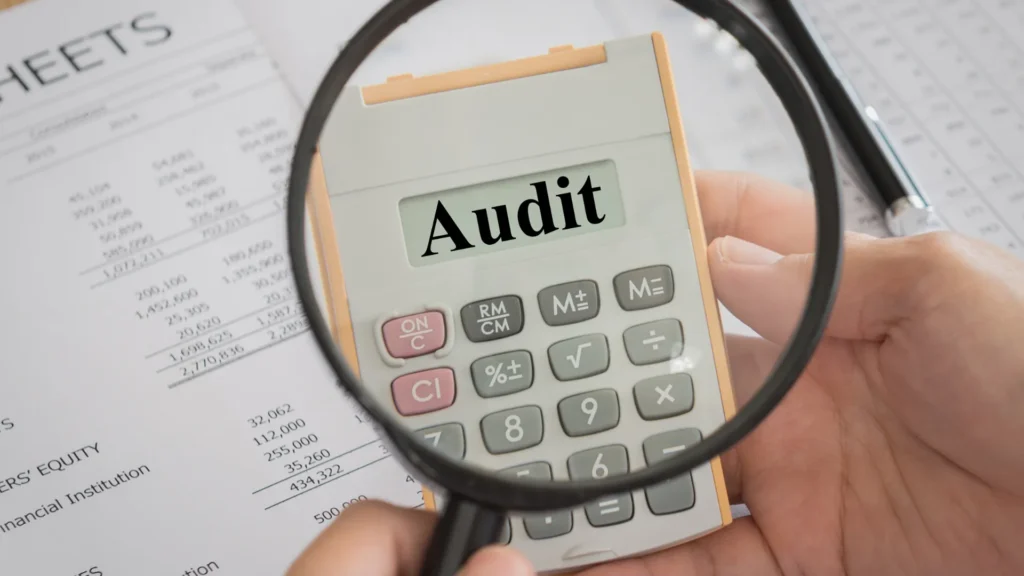Receiving the news that your tax return is being audited can be a concerning development. Many people immediately wonder what does being audited mean and whether it signals a serious problem. In reality, understand that being audited doesn’t always mean something is wrong. Audits are a routine part of ensuring taxpayers meet their tax obligations. Read on to learn more about IRS audits and what being audited truly means.
What Is a Tax Return Audit?
An IRS tax audit is a formal review of your tax return and supporting documents to ensure that income, deductions, and credits are reported accurately and correctly.
Understanding what does being audited mean can help reduce unnecessary stress. While having your tax return audited may appear alarming, this critical step can happen to anyone and shouldn’t worry you, especially if you have done nothing wrong.
Common IRS Audit Misconceptions
“Only people who did something wrong get audited.” Not true. When you understand what does being audited mean, it becomes clear that the IRS can conduct audits at random, even for law‑abiding taxpayers.
“Getting audited means I’m going to owe a lot of money.” IRS audits will examine the accuracy of the information reported. This doesn’t necessarily imply that you will owe more money to the authority.
Even if discrepancies are discovered, you have the opportunity to correct them. In fact, many audits yield no changes or even a refund. If you missed a calculation and ended up paying more taxes than you should, you can be notified by an audit and receive a refund.

Why Is My Tax Return Being Audited?
Common Triggers for a Tax Audit
Knowing what does being audited mean also involves understanding why the IRS might review a return. Triggers can include math errors, mismatched income reports, unusually high deductions, or random selection through IRS algorithms.
Math errors or inconsistencies in reported income: Even simple mistakes, such as typos and miscalculations, can alert the IRS.
The reported income must also match the forms employers or clients submit, such as W-2s. Ensure there are no discrepancies between the income you declare and what your employer has reported.
Unusually high deductions or charitable donations: If the amount you deduct or donate seems disproportionate, this will raise a red flag.
For example, claiming $30,000 in charitable donations on a $60,000 income may appear suspicious, particularly if you don’t have clear documentation, such as receipts or letters from the charity.
Large business losses or self-employment income: The IRS may audit self-employed individuals or business owners who have reported significant business losses year after year, as this could indicate underreporting income or inflating expenses.
The IRS may verify the figures to ensure they’re legitimate, not personal expenses disguised as business deductions.
Random selection by IRS algorithms (DIF score system): The IRS uses a Discriminant Inventory Function (DIF) system to assist in selecting returns based on the likelihood of errors. While high DIF scores may trigger an audit, individuals can still be selected using algorithms even if there are no apparent errors.

Types of Audits
Each type of audit, correspondence, office, or field, reflects a different level of review. Recognizing what does being audited mean in each context helps you prepare for the process and respond appropriately.
Correspondence
A correspondence audit is conducted entirely by mail, including resolution. The IRS will request documentation or clarification on some items listed on your returns.
Office
As the name implies, office audits are conducted in person at the local IRS office. The auditor will review the items in question and may request additional documentation or explanation.
Field
This type of audit is the most in-depth and usually occurs in more serious cases or with high-income earners. IRS agents conduct these audits at the taxpayer’s home or at their place of business.
What Should I Do If I’m Being Audited?
1. Read the IRS Letter Carefully
If you’re selected for an audit, you’ll be notified by letter from the IRS. The letter will include the tax year under review, the items being examined, and the type of audit being conducted.
It’s critical that you read the IRS letter carefully and understand what it’s asking. Misinterpretation of information can result in the provision of incorrect documents and irrelevant information, which can lead to further problems.
2. Gather Supporting Documentation
If errors or discrepancies are found, you’ll be prompted to provide supporting documentation. Depending on the items being reviewed, this may include bank statements, receipts, employment records, acknowledgment letters for charitable donations, and other relevant documents.
Make sure the documentation you provide is relevant to the issue at hand, as it will be used as evidence to prove your case.
3. Respond Promptly and Accurately
When dealing with the IRS, time is of the essence. Timely and precise responses demonstrate cooperation and can help prevent the audit from being escalated.
Whether the audit is conducted by mail, in an IRS office, or at your location, make sure your submission addresses the IRS’s concerns directly.
Possible Tax Return Audit Outcomes

Tax audits can have various outcomes, depending on the findings and resolution of discrepancies.
No changes:
This means that your tax returns have been determined to be accurate or that the documents you provided to resolve the discrepancies are sufficient to prove your case. In these cases, no additional action is required. This would be the best possible outcome of the audit.
Agreed change:
Occurs when errors are discovered, but you and the IRS have agreed on a resolution, and adjustments have been made. For example, if you fail to report some of your income, you agree to pay the remaining taxes and any penalties and interest.
Disagreed change:
This occurs when disagreements arise with the IRS regarding the audit results, and a resolution is not reached. The following steps may include filing an appeal, meeting with an auditor to discuss the differences, or taking other actions, such as bringing the case to tax court. This outcome is complex, so professional assistance is strongly advised.
Conclusion
If your tax return is being audited, it can be nerve-wracking because most of us believe it results from doing something wrong and will lead to serious trouble. But understanding what does being audited mean can ease much of that anxiety.
While it’s true that breaking tax laws can result in an audit and additional problems, the IRS conducts audits through random selection, such as using algorithms, which can also target law-abiding citizens. However, if you’ve fulfilled all of your tax obligations by the regulations, you shouldn’t be concerned. In some cases, an audit may even result in a tax refund. Even if discrepancies are found, you have opportunities to correct them during the process.
Contact Greenberg Law Group to help you accurately report your tax returns and identify any errors or discrepancies before it’s too late, preventing dealing with the authorities.




